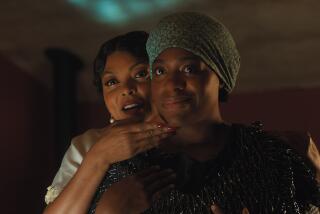STAGE REVIEW : The Great ‘Jake’ Remake : Major Rewrite Makes It One of Simon’s Best
- Share via
NEW YORK — Remember Jake? Two years ago, he was that neurotic heel who sat around his upscale apartment on the stage of the Old Globe Theatre in San Diego, whining at all the women in his life, real and reconstituted, and driving everyone crazy. “Everyone” very much included the audience.
Now here we are again at home with Jake, who is again visiting with his fantasies, his women and his neurosis in a rewrite of Neil Simon’s “Jake’s Women” that makes us wonder if this can be the same Jake.
The answer, of course, is that it’s not. People change, especially Neil Simon people. And that’s not merely because a new man, Alan Alda, has the title role. It’s also because Simon is one of the few playwrights you can trust when he says he’s rewritten 70% of his play. He has. “Jake’s Women” in San Diego was so unworkable that Simon himself pulled the plug, aborting a scheduled 1990 Broadway opening in the nick of time.
It was the expensive but right thing to do, as demonstrated by the far more subtle and engaging version that opened here Tuesday at the Neil Simon Theatre. This “Jake’s” is still recognizable. We’re still trapped in the man’s tortured deliberations with his wife, sister, analyst, daughter, date and former wife, all in various states of incarnation, either because they’re really there or because he’s dragged them in as figments of his hyperactive imagination. But the play is new in the respects that count. It is deeper, more complex and, above all, a lot more forthcoming.
Jake, a writer, is still a barely veiled alter ego for Simon himself. The play is still an exploration of his troubles with intimacy, his yearning for his dead first wife Julie (a classy Kate Burton) that serves to ruin the marriage to his second one, Maggie (Helen Shaver, full of shading and pain). The difference here is that, under pressure, Jake finally makes certain humanizing admissions, acknowledging his limitations and showing us the painful reasons behind them. It is the magic key that unlocks the play.
Aside from the pleasantly understated central presence of Alda, a Jake you instinctively trust, Gene Saks is directing, and no one knows how to map the Simon territory better. Nor do we have quite the same women tormenting Jake’s mind. Joyce Van Patten and Talia Balsam are the only holdovers from the original cast, but their roles as therapist and new date, respectively, have shifted some, especially Van Patten’s as Jake’s analyst Edith. Jake may characterize her as “a mother with a diploma,” but it’s an affectionate more than a critical statement. She’s not the bimbo she once was, just a lady with a good sense of humor who wants to help.
Balsam’s terrific Sheila, the relatively sane woman Jake has been dating since he and Maggie separated, has the play’s cleverest and only unequivocally comic scene, wisely retained from San Diego. She’s caught in an absurdist conversational crossfire between Jake and the invisible Maggie of his mind that sends poor real-live Sheila screaming out the door.
Brenda Vaccaro’s scene-stealing sister Karen is another changed woman. Gone is the irritating yenta. In her place is a middle-aged someone with chutzpah who’d like to straighten out her screwed-up brother and winces at the tasteless outfits his imagination keeps dressing her in.
Best of all, these women have all gained in stature without gaining in sentimentality. Even Burton’s appealing Julie, the dead wife Jake can’t forget, demands that Jake dignify her by remembering her as she really was, not as he thinks she was. She also demands to meet her grown-up daughter Molly (a lovely Tracy Pollan) in a beautifully crafted scene whose vigorous and unexpected outcome points the way to an optimistic resolution. (Genia Michaela plays Molly at 12 with unvarnished directness; Pollan plays her with style and simplicity at 21.)
Simplicity characterizes the production. Santo Loquasto has provided costumes that augment character, and an unostentatious set that limits playing room but allows for an airy sense of abstract mental space. Tharon Musser’s multiple banks of lights do a skillfully unobtrusive job, but it’s finally Simon who has done the most skillful and unobtrusive one. His characters now are real, his points of view challenging and his dialogue honest: terse, wistful, ironic, gently self-deprecating and organically bittersweet.
There is a hopeful moment at the end when Jake tentatively reaches across the Great Divide of his emotions to touch the hand of elegant Maggie. It is a supplicant, unforgettable gesture across a gap as narrow and as deep as the one that separates the old “Jake’s Women” from the new one. Amazing what a difference two years can make.
More to Read
The biggest entertainment stories
Get our big stories about Hollywood, film, television, music, arts, culture and more right in your inbox as soon as they publish.
You may occasionally receive promotional content from the Los Angeles Times.










